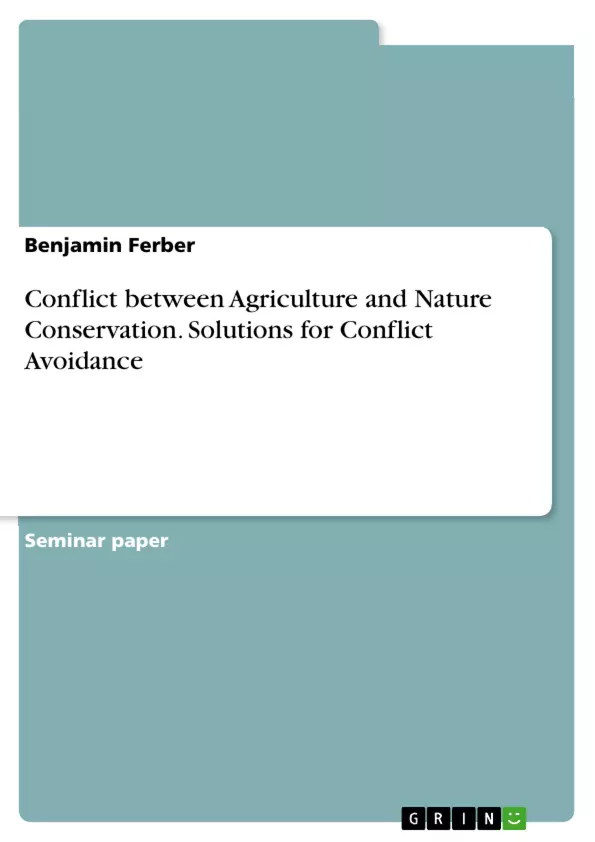Agriculture is of fundamental importance for food production and economic growth. However, it also has negative impacts on the natural environment. In particular, the use of fertilizers can lead to soil and water pollution and affect biodiversity. On one hand, nature needs to be protected, which requires reducing negative environmental impacts and safeguarding important ecosystems. On the other hand, sustainable and economic agriculture requires the use of certain practices that bring negative environmental impacts. Therefore, there is a conflict between agriculture and conservation, which requires finding an appropriate balance. This paper focuses on this conflict and possible solutions to it. Specifically, it examines the effects of fertilizers on biodiversity, water quality, and soil quality. Various fertilizers used in agriculture are presented, and a comparison is made between chemical and organic fertilizers. The paper also aims to provide ways to reduce the negative environmental impacts caused by fertilizers.
Inhaltsverzeichnis (Table of Contents)
- Abstract
- Introduction
- Material and Methods
- Results
- Fertilizers in Agriculture
- Chemical fertilizers
- Organic fertilizers
- Negative impacts of fertilizers on the environment
- Effects on biodiversity
- Impacts on water quality
- Impact on soil quality
- The effects of the different fertilizers
- Fertilizers in Agriculture
- Discussion
- Chemical fertilizers vs organic fertilizers
- Measures to avoid negative environmental impacts
- Ban on fertilizers
- Possible technical measures
- Measures of the Federal Government in Germany
- References
Zielsetzung und Themenschwerpunkte (Objectives and Key Themes)
This paper explores the conflict between agriculture and nature conservation, specifically focusing on the use of fertilizers and their impact on the environment. The main objective is to analyze the effects of fertilizers on biodiversity, water quality, and soil quality, comparing chemical and organic fertilizers. The paper also aims to propose solutions for minimizing the negative environmental impacts of fertilizers.
- The conflict between agricultural practices and nature conservation
- The impact of fertilizers on the environment, particularly on biodiversity, water quality, and soil quality
- A comparison of chemical and organic fertilizers, highlighting their advantages and disadvantages
- Strategies for reducing the negative environmental impacts of fertilizers
- The role of government regulations and initiatives in promoting sustainable agriculture
Zusammenfassung der Kapitel (Chapter Summaries)
The paper begins with an introduction that highlights the importance of agriculture for food production and economic growth, while also acknowledging its potential negative impacts on the environment, particularly the use of fertilizers. The introduction emphasizes the need for a balance between economic interests and environmental protection.
The "Material and Methods" chapter describes the research methodology, outlining the comprehensive literature review conducted across various databases, including ResearchGate, ScienceGate, ScienceDirect, and Google Scholar. The chapter details the selection process and the inclusion of relevant articles based on keywords related to fertilizers, environmental protection, agriculture, and nature conservation.
The "Results" chapter examines the use of fertilizers in agriculture, exploring their role in improving plant growth and yields. It emphasizes the importance of nutrients like nitrogen, phosphorus, and potassium for plant development and discusses how fertilizers can help achieve higher yields and improve crop quality. The chapter also touches on the regulation of fertilizer use in Germany, highlighting the Fertilizer Regulation and the Fertilizer Application Regulation.
Schlüsselwörter (Keywords)
Key concepts explored in the paper include fertilizers, environmental protection, agriculture, nature conservation, biodiversity, water quality, soil quality, chemical fertilizers, organic fertilizers, sustainable agriculture, and government regulations.
- Quote paper
- Benjamin Ferber (Author), 2023, Conflict between Agriculture and Nature Conservation. Solutions for Conflict Avoidance, Munich, GRIN Verlag, https://www.grin.com/document/1458185



